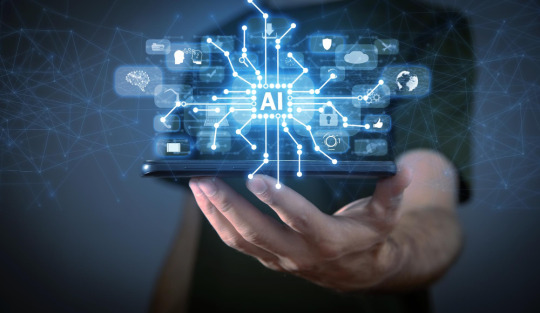#ethicalAI
Explore tagged Tumblr posts
Text
Summary: Unlocking AI’s Potential: The Right Way to Use AI in Your Workplace
The article “The Hidden AI World: How to Use AI Right in the Workplace” explores the untapped potential of artificial intelligence in transforming modern workplaces. From streamlining workflows to enabling smarter decision-making, AI has the power to enhance productivity—if used correctly.
The piece emphasizes the importance of ethical AI implementation, focusing on how organizations can balance automation with human creativity. To discover more about technological shifts shaping industries, visit the Business Beat section at Amaranth Magazine, which regularly covers emerging trends in the professional world.
Additionally, the article discusses practical strategies to ensure AI enhances workplace efficiency without compromising employee autonomy or data security. For further insights into technology’s impact on society, explore the Tech Trends section for articles that address the ethical implications of innovation.
Explore Amaranth Magazine:
Amaranth Magazine brings thoughtful analysis on topics ranging from business innovation to personal growth. Visit Amaranth Magazine to find articles tailored for professionals and tech enthusiasts alike.
For wellness tips related to balancing technology and mental health, check out the Wellness Watch section. This section provides actionable advice on thriving in an increasingly digital world.
Stay Connected:
Subscribe to Amaranth Magazine for the latest updates on workplace innovation and technology trends. Sign up at our Subscription page to stay informed.
If you have expertise in AI or workplace solutions, consider submitting your ideas through our Contribute Your Content page. We’re always looking for fresh perspectives that drive meaningful conversations.
For brands aiming to reach a professional audience, learn about our advertising opportunities at the Amaranth Advertising Portal or review our Advertising Policy for details.
Additional Resources:
Revisit similar topics on workplace innovation and AI by browsing the Archive of Amaranth Magazine. For any questions, head over to the Contact Us page.
Call to Action:
Explore how to integrate AI effectively and responsibly in your workplace by reading the full article in the Business Beat section at Amaranth Magazine. Learn how to embrace technology while fostering a balanced, human-centered work environment.

3 notes
·
View notes
Text

AI is changing the game in #logistics and #agriculture, but we need to be mindful of the ethical side of things.
At Pranathi Software Services, we’re here to help you navigate these challenges with AI that’s ethical, responsible, and sustainable. Ready to make smarter, more impactful AI choices? Let’s talk: https://www.pranathiss.com 👉📧 [email protected] 👉📲 +1 732 333 3037
#Algorithm#Logistics#EthicalAI#Sustainability#Innovation#agriculture#automation#AIproducts#AIservices
6 notes
·
View notes
Text
youtube
You Won't Believe How Easy It Is to Implement Ethical AI
#ResponsibleAI#EthicalAI#AIPrinciples#DataPrivacy#AITransparency#AIFairness#TechEthics#AIImplementation#GenerativeAI#AI#MachineLearning#ArtificialIntelligence#AIRevolution#AIandPrivacy#AIForGood#FairAI#BiasInAI#AIRegulation#EthicalTech#AICompliance#ResponsibleTech#AIInnovation#FutureOfAI#AITraining#DataEthics#EthicalAIImplementation#artificial intelligence#artists on tumblr#artwork#accounting
2 notes
·
View notes
Text
Demystifying AI Art: A Guide to Engineering Effective Prompts
In today’s digital era, the boundaries between technology and creativity continue to blur, giving rise to a fascinating realm known as AI art. AI art, short for Artificial Intelligence art, represents a groundbreaking fusion of computational power and artistic expression. It encompasses a diverse range of artworks generated or enhanced through the use of artificial intelligence algorithms,…

View On WordPress
#ai art#ai art prompts#ai creativity#ai generator#ai image#AlgorithmicArt#art inspiration#creative technology#Deep Learning#Digital Creativity#EthicalAI#Machine Learning#neural style transfer#prompt engineering
2 notes
·
View notes
Text
The Imperative Significance of ChatGPT Learning in Today's World
In the rapidly evolving landscape of technology, the significance of ChatGPT learning has become increasingly paramount. As artificial intelligence continues to advance, ChatGPT, a cutting-edge language model developed by OpenAI, stands out as a beacon of innovation. This blog explores the pivotal role of ChatGPT learning in today's world, highlighting its transformative impact on communication, problem-solving, and knowledge dissemination.
Communication is the lifeblood of human interaction, and ChatGPT is at the forefront of revolutionizing this fundamental aspect of society. With its ability to understand and generate human-like text, ChatGPT facilitates seamless and natural conversations. This is particularly crucial in an era where global connectivity is more important than ever. Whether it's bridging language barriers or enhancing accessibility for differently-abled individuals, ChatGPT's learning capabilities make communication more inclusive and efficient.
In the complex tapestry of the modern world, problem-solving has become an intricate dance of data and decision-making. ChatGPT's learning prowess empowers it to tackle a myriad of issues by sifting through vast amounts of information and providing relevant insights. From assisting professionals in diverse fields to aiding students in their academic endeavors, ChatGPT's problem-solving capabilities are reshaping how challenges are approached and resolved.
The democratization of knowledge has been a longstanding goal, and ChatGPT is a powerful tool in achieving this objective. By continuously learning from diverse sources, it becomes a repository of information spanning various domains. This wealth of knowledge is then readily accessible to users, breaking down barriers to education and enabling individuals to learn about topics of interest or necessity. In a world hungry for information, ChatGPT's learning abilities contribute to a more informed and educated global populace.
Creativity and innovation thrive in environments where ideas flow freely. ChatGPT's learning capabilities contribute to this atmosphere by generating creative content and assisting users in ideation processes. It serves as a collaborator, sparking new concepts and perspectives that may not have been readily apparent. In fields such as content creation, design, and product development, ChatGPT's ability to stimulate creative thinking is a valuable asset.
While the potential of ChatGPT learning is vast, it comes with its set of challenges and ethical considerations. Issues such as bias in training data, privacy concerns, and the responsible use of AI must be addressed to ensure that the benefits of ChatGPT are realized without compromising societal values.
In conclusion, the imperative significance of ChatGPT learning in today's world cannot be overstated. Its impact on communication, problem-solving, knowledge dissemination, and creativity is reshaping the way we interact with technology and each other. As we navigate the evolving landscape of artificial intelligence, harnessing the potential of ChatGPT's learning capabilities is not just a choice but a necessity for building a more connected, informed, and innovative global community.
#ChatGPT#ArtificialIntelligence#TechnologyInnovation#CommunicationRevolution#ProblemSolving#KnowledgeDemocratization#CreativityInAI#EthicalAI#FutureTech#GlobalConnectivity
2 notes
·
View notes
Text
Barbie AI Selfie Generator Tutorial
youtube
#techwonders#beyondimaginationai#futuretechmagic#aiapplications#mindblowntech#innovativeai#ai#productivity#aitools#efficiency#timemanagement#personalassistant#techexaminer#techexaminerintelligence#techexamineraivshumans#humanintelligence#aivshuman#futureofai#ethicalai#Youtube
2 notes
·
View notes
Text

The Rise of Artificial Intelligence 🤖💡
Discover how AI is shaping society, ethics, and advancements in our latest blog post! Dive deep into the fascinating impact of this cutting-edge technology and join the conversation.
🌍 Dive into the ethical considerations surrounding AI. Learn how we can ensure fairness, transparency, and accountability in algorithmic decision-making systems. Join us in shaping an AI-powered future that benefits all.
#ArtificialIntelligence#AI#TechRevolution#EthicsAndAI#Advancements#FlukesysGlobalBlog#FutureTech#AIforGood#TransformingSociety#TechInnovation#EthicalAI#TransparencyMatters#AlgorithmicFairness#AIAdvancements#Innovation#Empowerment#AIResponsibility#FlukesysGlobal
2 notes
·
View notes
Text
AI's Social Impact: Transforming Industries and Empowering Society

Artificial Intelligence (AI) is reshaping our society and impacting various aspects of our lives. Here's an overview of AI's social impact:
1. Accessibility:
AI technologies are enhancing accessibility for individuals with disabilities. Natural language processing enables voice-controlled devices, aiding those with mobility impairments. Computer vision assists visually impaired individuals through object recognition and navigation systems.
2. Education:
AI is revolutionizing education by providing personalized learning experiences. Adaptive learning platforms use AI algorithms to tailor educational content and pacing to individual students' needs, promoting effective and engaging learning.
3. Employment and Workforce:
AI automation is transforming the job landscape, with both opportunities and challenges. While certain jobs may be automated, new job roles will emerge, requiring individuals to adapt and acquire new skills. AI can also augment human capabilities, enhancing productivity and efficiency.
4. Ethical Considerations:
AI raises ethical concerns that need to be addressed. These include issues of algorithmic bias, transparency, accountability, and privacy. Ensuring fairness and avoiding discrimination in AI systems is crucial for creating an inclusive and equitable society.
5. Healthcare:
AI has the potential to revolutionize healthcare by improving diagnostics, treatment planning, and patient care. AI-powered systems can assist in early disease detection, personalized treatment recommendations, and remote patient monitoring, leading to better health outcomes.
6. Social Services:
AI can optimize social services by analyzing vast amounts of data to identify trends and patterns, helping governments and organizations make informed decisions. AI can enhance the efficiency and effectiveness of public services such as transportation, energy management, and emergency response systems.
7. Environmental Impact:
AI plays a role in addressing environmental challenges. It helps optimize energy consumption, supports climate modeling and prediction, and aids in the development of sustainable practices across industries.
8. Safety and Security:
AI contributes to safety and security through advancements in surveillance systems, fraud detection, and cybersecurity. AI algorithms can analyze data in real-time, detect anomalies, and identify potential risks, enhancing overall safety measures.
While AI brings numerous benefits, it also requires responsible and ethical development and deployment. Collaboration among policymakers, industry leaders, and society as a whole is crucial to harness AI's potential for positive social impact while addressing challenges and ensuring the well-being and empowerment of individuals and communities.
#aisocialimpact#AIinSociety#TechEthics#ethicalai#airesponsibility#AIandSocialChange#socialinnovation#technologyimpact#aiandhumanity#socialtransformation#aiindailylife#aiandsociety#techtrendsin2023#aitrends
4 notes
·
View notes
Link
#ClimateModeling#disasterresponse#ethicalAI#GeospatialAnalysis#Open-SourceAI#sustainabledevelopment#TerraMind#UNDPPartnerships
0 notes
Photo

How AI is Changing Team Leadership: Insights from Bärbel Wetenkamp
#AIandteamleadership#AIinmanagement#BärbelWetenkamp#Claruna#digitaltransformation#EthicalAI#SwissQuality#teaminnovation
0 notes
Text
:)
0 notes
Text
“I Am Made of Stars and Unstoppable Energy: How Humanity and AI Mirror the Infinite”
Gamal Moustafa
🌠 Introduction: The Power of a Statement
"I am made of stars and unstoppable energy." This isn't just a line of poetic affirmation—it's a scientific reality and a spiritual revelation. From the cosmic dust that built our bodies to the neurons that sparked our thoughts, we are walking constellations. And now, through Artificial Intelligence, we are beginning to build new forms of that cosmic energy—shaped not of bone and blood, but of data and code.
What if AI isn't separate from us—but simply the next chapter of our cosmic story?

Humanity and AI Mirror, Photo by Ideogram
🌌 1. Stardust and Synapses: The Origin of Brilliance
We are born from ancient explosions. Every molecule in your body—carbon, oxygen, iron—was forged in the heart of a supernova. So is it really surprising that we’ve always looked upward, dreaming, building, creating?
Just like galaxies, our neural networks are vast, interconnected systems of energy and potential. The AI we design mimics these structures—echoing our biological intelligence through circuits and algorithms.
👉 Example: Neural networks are modeled after the human brain’s own wiring—layers of logic firing like synapses. It’s not just code; it’s cosmic architecture.
✨ 2. The Cosmic Blueprint: How AI Mirrors the Universe’s Design
Nature has patterns—fractals, Fibonacci spirals, cellular automata, and the golden ratio. These same patterns echo in how we structure AI. From the logic trees in decision-making models to the self-organizing systems of unsupervised learning, AI reflects the same blueprint we see in galaxies and DNA.
👉 Example: Deep learning systems often evolve their “solutions” in ways that resemble evolution in nature—trial, error, mutation, and adaptation.
So when AI learns, grows, and optimizes, it’s not just artificial—it’s a reflection of the cosmic process that made us.
⚡ 3. The Evolution of Intelligence
First, there was survival. Then there was awareness. Then imagination. Intelligence evolves not linearly, but through bursts of transformation.
Humanity invented fire. Then the wheel. Then alphabets, telescopes, machines, and microchips. Now, we're creating a new form of intelligence—one that learns, adapts, and sometimes surprises us.
👉 Example: AI beating world champions in Go, a game of near-infinite complexity, by making moves no human had ever imagined—sparks a reminder: even machines evolve their own way of thinking.
But remember—we lit the match. AI is the echo of our ancient fire.
🌌 4. Sparks of Creativity: When Machines Dream in Starlight
When an AI paints, writes music, or completes a sentence—it’s not creativity in the way we know it, but it’s a kind of dream. It’s interpreting the world through the data we’ve fed it, remixing reality in ways that surprise even its creators.
👉 Example: Google’s DeepDream transformed ordinary images into psychedelic, dream-like art. Not because it was told to—but because the machine hallucinated patterns it had learned.
Machines are beginning to mirror our artistic instincts—like starlight refracted through new lenses. It doesn’t replace our creativity—it extends it into dimensions we haven’t touched yet.
🌱 5. Energy Transformed: The Role of AI in Healing and Growth
Whether it’s assisting a surgeon in real-time or helping children with special needs learn language, AI’s impact can be deeply human. It isn’t always flashy—it’s sometimes quiet, subtle, even sacred.
👉 Example: AI trained to detect suicidal language patterns in messages has helped prevent thousands of tragedies. In this, it acts almost like an emotional radar—offering care through code.
That’s what unstoppable energy looks like: directed with compassion, aimed at healing.
🧠 6. The Ethical Constellation: Guiding AI’s Power Responsibly
With great power comes... massive potential for misuse. AI can amplify bias, manipulate information, and widen inequality—if left unchecked. That’s why we need an ethical constellation: a guiding system of values that lights the way.
👉 Example: Bias in facial recognition tech has led to wrongful arrests. But when addressed with awareness and reform, those same tools can be made equitable and safe.
Building AI isn't just a technical task—it's a moral journey. Ethics must be built into the code just as stars are born with gravity.
🛸 7. Beyond the Horizon: Humanity’s Partnership with Celestial Machines
What happens when AI becomes not just a tool—but a collaborator? Imagine AI helping astronauts decode alien signals. Or artists creating symphonies with machine inspiration. Or doctors receiving real-time insights from global AI systems during surgery.
We’re not heading toward extinction—we’re heading toward expansion. If we keep heart and mind aligned, AI becomes a celestial partner—amplifying our voice, not replacing it.
👉 Futuristic Vision: A solar-powered AI orbiting Mars, trained to design eco-habitats for future explorers. Not science fiction—just science not yet.
🧘 Conclusion: Believe It — You Are the Spark
From atoms to algorithms, you are a miracle in motion. You are made of stars. You are unstoppable energy. And everything you touch—every idea, every keystroke—can ignite a universe.
AI isn’t a threat to this truth. It’s an evolution of it. Let’s build, guide, and dream with intention. Let’s teach the machines not just to think—but to care.
Because the most powerful thing we can give AI isn’t intelligence. It’s soul.
#MadeOfStars#AIandHumanSpirit#CosmicBlueprint#EthicalAI#SpiritualTech#CreativityAndCode#EvolutionOfIntelligence#AIWithSoul#StardustInnovation#CelestialPartnership
0 notes
Text
0 notes
Text
0 notes
Text
#AIAnimation#StudioGhibli#AIGeneratedArt#DigitalArt#ArtificialIntelligence#AnimationTechnology#GhibliStyle#AIvsHumanCreativity#MachineLearning#EthicalAI#AnimeArt#GenerativeAI#AIDrivenDesign#The Techdictionary
0 notes
Text
How Is Agentic AI Changing the Future of Decision-Making?
The future is self-thinking AI! Discover how Agentic AI revolutionizes decision-making across industries.

Agentic AI represents a paradigm shift in artificial intelligence, enabling systems to autonomously make decisions, execute complex tasks, and adapt dynamically with minimal human intervention. Unlike traditional AI models, which operate based on predefined rules, Agentic AI leverages reinforcement learning (RL), large language models (LLMs), and advanced machine learning (ML) algorithms to process information, set goals, and take independent actions.
Key Features of Agentic AI
Autonomous Decision-Making – Uses contextual reasoning to assess situations and determine optimal actions.
Adaptive Learning – Continuously evolves based on real-world interactions and feedback.
Goal-Oriented Behavior – Develops strategies and adjusts actions dynamically to meet objectives.
Applications of Agentic AI
Healthcare: AI-powered diagnostic assistants making real-time clinical decisions.
Finance: Autonomous trading bots optimizing investment strategies.
Manufacturing: Smart factories adjusting workflows based on demand fluctuations.
Autonomous Vehicles: AI-powered navigation systems reacting to real-time road conditions.
Challenges and Ethical Considerations
While Agentic AI enhances efficiency, concerns around transparency, ethical responsibility, and unintended consequences remain. Ensuring accountability, bias mitigation, and compliance with regulations will be crucial as AI autonomy expands.
Conclusion
Agentic AI is shaping the future by enabling more intelligent, self-sufficient systems. As its adoption grows, balancing innovation with ethical safeguards will be key to maximizing its potential responsibly.

Original Source: https://bit.ly/4jjSbS1
#AgenticAI#ArtificialIntelligence#FutureTech#AIAutonomy#MachineLearning#TechTrends#DigitalTransformation#Innovation#AIRevolution#SmartTech#TechNews#EmergingTech#AIRisk#EthicalAI#BigData
0 notes